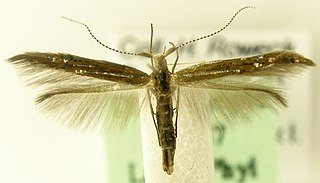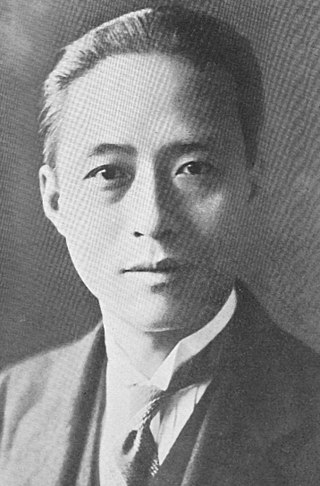Academia Sinica, headquartered in Nangang, Taipei, is the national academy of the Republic of China (Taiwan). Founded in Nanking, the academy supports research activities in a wide variety of disciplines, ranging from mathematical and physical sciences, to life sciences, and to humanities and social sciences. As an educational institute, it provides PhD training and scholarship through its English-language Taiwan International Graduate Program in biology, agriculture, chemistry, physics, informatics, and earth and environmental sciences.

The Coleophoridae are a family of small moths, belonging to the huge superfamily Gelechioidea. Collectively known as case-bearers, casebearing moths or case moths, this family is represented on all continents, but the majority are found in temperate areas of the Northern Hemisphere. They are most common in the Palearctic, and rare in sub-Saharan Africa, South America, and Australia; consequently, they probably originated in northern Eurasia. They are relatively common in houses, they seek out moist areas to rest and procreate.

Goniodoma is a genus of moths, belonging to the family Coleophoridae.
Coleophora binotapennella is a moth of the family Coleophoridae. It is found in Spain, France, Germany, the Czech Republic, Slovakia, Hungary, Romania, North Macedonia, Lithuania, Ukraine, northern and southern Russia and China. It occurs in desert-steppe and desert biotopes.
Coleophora acanthabortiva is a moth of the family Coleophoridae. It is endemic to Mongolia.
Coleophora sinensis is a moth of the family Coleophoridae. It is found in Shanxi and Hebei provinces of China.
Coleophora yuzhongensis is a moth of the family Coleophoridae. It is found in Gansu, China.
Coleophora rectimarginalis is a moth of the family Coleophoridae. It is found in Heilongjiang, China and in Korea.
Coleophora quadrifurca is a moth of the family Coleophoridae. It is found in Shaanxi, China.
Coleophora ochroptera is a moth of the family Coleophoridae. It is found in Xinjiang, China.
Coleophora jaculatoria is a moth of the family Coleophoridae. It is found in Shaanxi, China.
Coleophora dangchuanica is a moth of the family Coleophoridae. It is found in Gansu, China.
Coleophora fengxianica is a moth of the family Coleophoridae. It is found in Shaanxi, China.
Coleophora gongliuensis is a moth of the family Coleophoridae. It is found in Xinjiang, China.
Coleophora gemmiformis is a moth of the family Coleophoridae. It is found in Tibet.
Goniodoma auroguttella is a moth of the family Coleophoridae. It is found in southern Europe, European Russia and Asia Minor. The habitat consists of steppe and semi-desert biotopes.

Goniodoma limoniella is a moth of the family Coleophoridae. It is found in western Europe and the Mediterranean region.
Goniodoma millierella is a moth of the family Coleophoridae. It is found in France, Italy and Tunisia.
Goniodoma nemesi is a moth of the family Coleophoridae. It is found in Croatia, Italy, Greece and Romania.

Zhu Jiahua or Chu Chia-hua was a Chinese scientist, geologist and Kuomintang politician in the Republic of China. In the early 1930s he served as Minister of Communications for the Nationalist Government in Nanjing. He was the Vice Premier in 1949–1950. Zhu became acting president of Academia Sinica upon the death of Cai Yuanpei in 1940, and was responsible for organizing the relocation of its institutes from China to Taiwan during the Chinese Civil War and a period of low monetary funds. Zhu repurposed funds originally set aside for Chinese students to study abroad. Although the Kuomintang government agreed with Zhu's actions when he first proposed them, Chiang Kai-shek later withdrew his approval and Zhu resigned as president of the Academia Sinica in 1957. Zhu was elected an academician of Academia Sinica in 1948. Following his death, Academia Sinica began hosting a lecture series in Zhu's honor.


